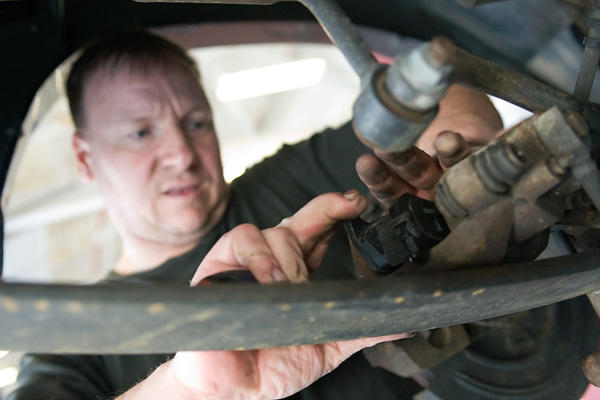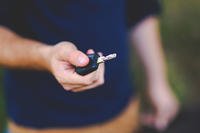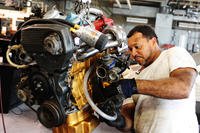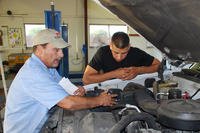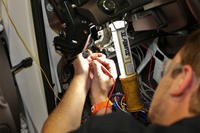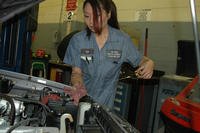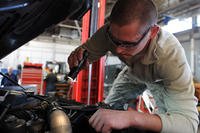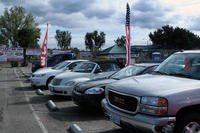If you're like most people, you're usually aware of only one part of your brake system: the brake pedal. You're so familiar with it, in fact, that you can probably tell if something's different just by the way the pedal feels when you step on the brakes.
To check your brake pedal, you simply do the same thing you do every time you drive: You step on the pedal and press it down. The only difference is that you should pay attention to how the pedal feels under your foot and evaluate the sensation. The following steps tell you what to feel for:
- Start your engine, but keep it in Park with the parking brake on. (If your vehicle doesn't have power brakes, it's okay to do this check with the engine off.)
- With the vehicle at rest, apply steady pressure to the brake pedal.
Does it feel spongy? If so, you probably have air in your brake lines. Correcting this problem isn't difficult; unless your brakes have ABS or other sophisticated brake systems, you can probably do the job yourself with the help of a friend. The "Bleeding Your Brakes" section later in this chapter tells you whether you can bleed the system on your vehicle and provides instructions for doing the job.
Does the pedal stay firm when you continue applying pressure, or does it seem to sink slowly to the floor? If the pedal sinks, your master cylinder may be defective, and that's unsafe.
- Release the parking brake and drive around the block, stopping every now and then (but without driving the people behind you crazy). Notice how much effort is required to bring your vehicle to a stop. With power brakes, the pedal should stop 1 to 11⁄2 inches from the floor. (If you don't have power brakes, the pedal should stop more than 3 inches from the floor.)
If your vehicle has power brakes and stopping seems to take excessive effort, you may need to have the power booster replaced.
- If you feel that your brakes are low (meaning that the pedal goes down too far before the vehicle stops properly), pump the brake pedal a couple of times as you drive around.
If pumping the pedal makes the car stop when the pedal's higher up, either a brake adjustment is in order or you need more brake fluid. Check the brake fluid level by following the instructions in the next section, "Checking your master cylinder."
Tip: If the level of brake fluid in the master cylinder is low, buy the proper brake fluid for your vehicle and add fluid to the "Full" line on your master cylinder. Check the fluid level in the cylinder again in a few days. If it's low again, check each part of the brake system, following the instructions in this chapter, until you find the leak, or have a brake specialist find it and repair it for you.
If you find that you're not low on fluid, drive carefully to your friendly service facility and ask them to remedy the situation. When they've worked their magic, the pedal shouldn't travel down as far before your vehicle stops.
Car Smarts: Disc brakes self-adjust and should never need adjusting. Drum brakes also have self-adjusting devices that should keep the drum brakes properly adjusted. If any of the self-adjuster components on drum brakes stick or break, the drum brakes won't adjust as they wear out, resulting in a low pedal.
- As you drive around, notice how your total brake system performs, and ask yourself these questions:
- Does the vehicle travel too far before coming to a stop in city traffic? If it does, either your brakes need adjusting or you need new brake linings.
- Does the vehicle pull to one side when you brake? On vehicles with front disc brakes, a stuck caliper and brake fluid leak can cause this problem. On vehicles with front drum brakes (antiques), a wheel cylinder may be leaking or stuck, or the brake shoes may be wear-ing unevenly. I explain how to check disc and drum brakes in the section "Getting at Your Brakes" later in this chapter.
- Does your brake pedal pulsate up and down when you stop in a non-emergency situation? A pulsating brake pedal usually is caused by excessive lateral run-out (mechanic-speak for wobbling from side to side), which causes a variation in the thickness of the discs. This can happen because your brakes are overheating from overuse.
Remember: ABS brakes sometimes pulsate when you need them to stop quickly, so don't confuse that with a braking problem. Make sure that your rear brakes are working; if not, they could be causing your front brakes to work too hard and overheat.• Does your steering wheel shake when you brake? If it does and you have disc brakes, your front brake discs need to be professionally machined or replaced.
- Do your brakes squeal when you stop fairly short? The squealing is a high-pitched noise usually caused by vibration. Squealing can occur when the brake linings are worn and need replacement, the brake drum or disc needs to be machined, the front disc brake pads are loose or missing their anti-rattle clips, the hardware that attaches the brake calipers is worn, or inferior brake linings are in use.
Properly functioning disc brakes are sometimes a little noisy, and totally eliminating a squeal can be difficult. When you open your brakes to check them, make sure that your brake discs or drums aren't badly scored or worn and that plenty of lining material is left. Also, the brake pads on disc-type brakes should fit properly into the caliper. Some disc brake pads require special shims to eliminate squeal.
- Caution: Do your brakes make a grinding noise that you can feel in the pedal? If so, stop driving immediately and have your vehicle towed to a brake repair shop. Further driving could damage the brake discs or drums. Grinding brakes are caused by excessively worn brake linings; when the lining wears off, the metal part of the brake pad or brake shoe contacts the brake disc or drum and can quickly ruin the most expensive mechanical parts of the brake system.
- Does your vehicle bounce up and down when you stop short? Your shock absorbers may need to be replaced.
Caution: Never put off brake work. If any of the checks in this chapter show that you have a problem, take care of the situation immediately. If your brakes fail, you (and other people) may be in serious trouble. Other kinds of automotive trouble may keep your vehicle from moving, but brake trouble keeps it from stopping. The rest (and you) may be history.
From Auto Repair for Dummies, copyright © 2009 by Wiley Publishing, Inc., Indianapolis, Indiana. Used by arrangement with John Wiley & Sons, Inc.

